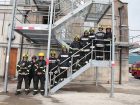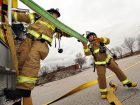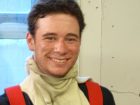
Features
Training
Trainer’s Corner: How to train rookie firefighters
This column will hopefully give some clarity to issues facing volunteer recruits, a.k.a rookies, newbies or probies. Across Canada, volunteer/paid on-call fire departments are required to ensure that all their members are given the highest level of training possible, and to provide each member with the needed knowledge and skills according to NFPA 1001.
July 17, 2017
By Ed Brouwer
Each volunteer department should have a recruit-training program that introduces the recruit to basic firefighting theory and skills. This must be done within a realistic time frame and should be taught by the training officer or his/her delegates. Note: a good training officer must have fire-ground experience, the ability to teach and time available to meet the needs of recruits.
Typically, firefighters are considered “new” in their first six to 18 months of service; there are two important criteria: length of time; and service.
Length of time speaks to the period during which recruits complete training; it should be long enough to provide the necessary introductory training but short enough so that the training can be completed in a way that does not exasperate the recruit. The training program should allow for the recruit to get out in the field and gain some experience. I recently spoke to a young man who, after four years, is still considered a recruit in his department. That, in my opinion, is way too long. Unfortunately, it is not unusual in his department to be a black helmet (their department’s way of indicating a rookie) for three to four years. This boils down to the department’s poor training policies.
It is pretty easy to feel unappreciated when your department doesn’t allow you to respond to calls. Imagine if your teenager got a learner’s permit and was not allowed to drive on any public roads for three or four years. You can’t expect young people to learn how to drive while parked in the driveway. If you are going to set a time frame, it must be consistent. Your department’s recruit training needs to be consistent and doable. You cannot have a well-what-should-we-do-tonight attitude.
We expect a lot from our newbies, but then again, we give them a lot.
The recruit-training program should be clearly outlined and executed in order to expedite the process. It must be purpose driven. Having a written course outline is the best way to ensure that each member receives the same training.
Volunteer recruitment training should include both theoretical and practical work. Recruits should be expected to attend a minimum of 80 per cent of the training and achieve 75 per cent or greater on tests and exams in order to complete the program. Set the bar high but set it fair.
Recruit training should be used as an introduction to fire fighting. Touch on all the Firefighter 1 topics: history and orientation; PPE/SCBA; firefighter safety; communications; fire behaviour; fire suppression. Note: I said touch on them; get the recruits started and then send them to the fire ground. Of course, limit the recruits’ involvement; be smart about it. Get them enrolled with your firefighters in the ongoing training program as soon as possible, but remember that recruit training should be taught at an introductory level. The purpose is to prepare new firefighters to safely perform fire-ground activities and support other firefighters at incidents. Areas of support may include emergency traffic, rehab, hose lays, salvage and overhaul.
New firefighters, once enrolled in the recruit-training program, should be allowed to respond to calls. However, they must wear something that identifies them as members in training. Everyone in the department must be aware of what new recruits are capable of, and be careful not to overstep those bounds. The safety of the recruits and department members is of paramount importance.
The bottom line is that recruits need experience that can be gained only on the fire ground. Consistently keeping newbies at the hall negatively affects them and your department. If your department can neglect to use recruits for three years, perhaps you have too many members; doing so simply sours volunteers who just want to serve their communities.
For me, fire fighting is all about honour and respect. I watch how recruits work, listen, participate and interact with other firefighters. But I can’t watch them if they are back at the hall . . . Have I driven that point home yet?
As an instructor, I look for many things besides fire knowledge. Certainly, attendance is of great importance, but I watch to see who comes early and who stays late. Sometimes I even leave an empty water bottle on the ground and watch to see who picks it up.
If I have to remind a recruit to do something which he or she is responsible for, I count it as a strike. I also give strikes to those who constantly spend time on their cell phones. I get ticked off by unnecessary tweeting, texting and talking when recruits should be listening and learning.
I certainly appreciate when rookies ask questions. But I find it disrespectful when a newbie constantly interrupts with an opinion. You don’t need to tell me how smart you are; I’ll discover that soon enough.
Yeah I’m a tough instructor, and most of what I look for has nothing to do with fire fighting. Mostly, I try to gauge the recruits’ character. Can I count on them to have my back?
Not all recruits are created equally. Every once in awhile, you meet one who makes you smile. One of our young firefighters impresses the heck out of me. Keller, at just 19, is our youngest firefighter and a real go-getter. He is always checking and cleaning equipment and gear. He looks after our SCBA, ensuring that everything is clean, organized and ready to go on the next call. I have never heard him bad-mouthing others or gossip. He is respectful to us old dogs and is ready to help with any training needs.
Treat your recruits with the respect you and your department wish to receive. Until next time, stay safe and remember: train like lives depend on it, because they do.
Ed Brouwer is the chief instructor for Canwest Fire in Osoyoos, B.C., and deputy chief training officer for Greenwood Fire and Rescue. Contact Ed at aka-opa@hotmail.com
Print this page
Advertisement
- Leading Edge: Program strengthens relationships between chiefs and CAO
- Leadership Forum: Aim for influence over rank in your department


